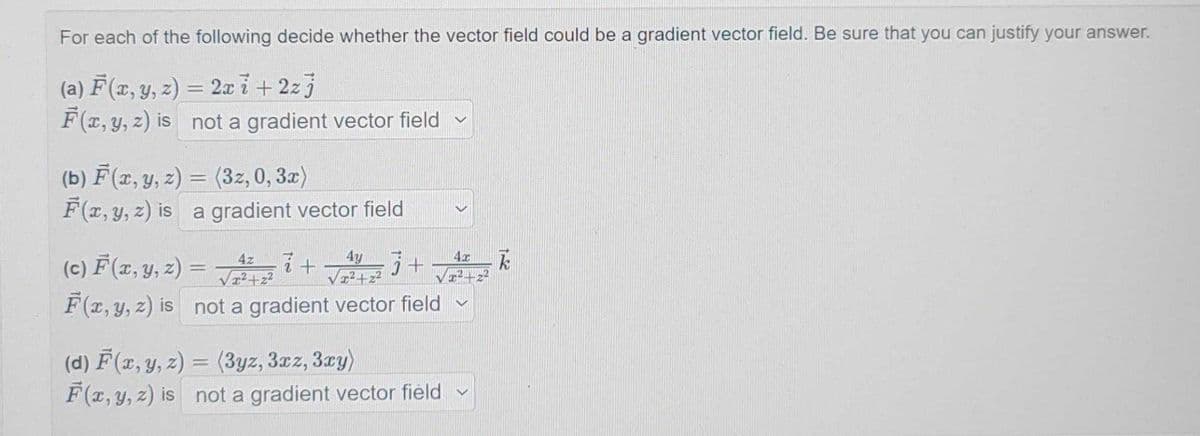For each of the following decide whether the vector field could be a gradient vector field. Be sure that you can justify your answer. (a) F(x, y, z) = 2x i + 2zj F(x, y, z) is not a gradient vector field (b) F(x, y, z) = (3z, 0, 3x) F(x, y, z) is a gradient vector field (c) F(x, y, z) = √² + √2²42²³ + 7 +2² F(x, y, z) is not a gradient vector field k √²+2
For each of the following decide whether the vector field could be a gradient vector field. Be sure that you can justify your answer. (a) F(x, y, z) = 2x i + 2zj F(x, y, z) is not a gradient vector field (b) F(x, y, z) = (3z, 0, 3x) F(x, y, z) is a gradient vector field (c) F(x, y, z) = √² + √2²42²³ + 7 +2² F(x, y, z) is not a gradient vector field k √²+2
Algebra and Trigonometry (MindTap Course List)
4th Edition
ISBN:9781305071742
Author:James Stewart, Lothar Redlin, Saleem Watson
Publisher:James Stewart, Lothar Redlin, Saleem Watson
Chapter9: Vectors In Two And Three Dimensions
Section9.FOM: Focus On Modeling: Vectors Fields
Problem 11P
Related questions
Question

Transcribed Image Text:For each of the following decide whether the vector field could be a gradient vector field. Be sure that you can justify your answer.
(a) F(x, y, z) = 2x7+2zj
F(x, y, z) is not a gradient vector field
(b) F(x, y, z) = (3z, 0, 3x)
F(x, y, z) is a gradient vector field
4z
4y
4x
(c) F(x, y, z)
=
7
√²+2+²+2
j+
k
F(x, y, z) is
not a gradient vector field
(d) F(x, y, z)
= (3yz, 3xz, 3xy)
F(x, y, z) is not a gradient vector field
Expert Solution
This question has been solved!
Explore an expertly crafted, step-by-step solution for a thorough understanding of key concepts.
Step by step
Solved in 3 steps with 2 images

Recommended textbooks for you

Algebra and Trigonometry (MindTap Course List)
Algebra
ISBN:
9781305071742
Author:
James Stewart, Lothar Redlin, Saleem Watson
Publisher:
Cengage Learning

Algebra and Trigonometry (MindTap Course List)
Algebra
ISBN:
9781305071742
Author:
James Stewart, Lothar Redlin, Saleem Watson
Publisher:
Cengage Learning